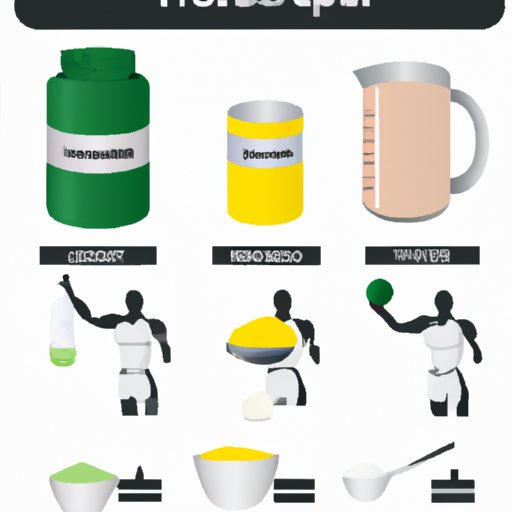
Introduction
Protein is a crucial macronutrient that is vital for maintaining optimal health. Without enough protein, the body cannot perform necessary functions such as tissue repair, hormone synthesis, and enzymatic reactions. However, the optimal amount of protein intake varies based on an individual’s age, gender, body composition, and physical activity level. So how much protein should you consume daily? In this article, we will explore the recommended protein intake for different needs and uncover the truth about protein consumption for muscle building, weight loss, and athletic performance.
The Importance of Protein for Optimal Health: How Much Protein Should You Consume Daily?
Protein is essential for building and repairing tissues, producing enzymes and hormones, and supporting immune function. Additionally, protein is vital for maintaining muscle mass and bone density. The recommended daily intake of protein depends on a variety of factors such as age, gender, and activity level.
According to the Recommended Dietary Allowance (RDA), a group of nutrient intake values developed by the Food and Nutrition Board of the Institute of Medicine, adults should aim to consume 0.8 grams of protein per kilogram of body weight per day. However, this amount is not a one-size-fits-all solution and may not be adequate for certain individuals.
For example, athletes and individuals engaging in regular exercise require more protein as their muscles experience more wear and tear. Generally, active individuals should consume 1.2-1.7 grams of protein per kilogram of body weight daily. Whereas older adults may benefit from a higher intake of protein to offset muscle loss and preserve bone density.
Not consuming enough protein can have numerous negative consequences such as impaired immune function, slowed recovery from injury, and muscle loss. Inadequate protein intake can also lead to weakness, fatigue, and poor concentration.
Finding the Right Balance: Understanding the Ideal Amount of Protein Intake for Your Body
Individuals vary in their protein requirements based on several factors such as age, gender, genetics, and physical activity level. Hence, it is necessary to determine the ideal daily protein intake for your body to maintain optimal health and prevent deficiencies.
To calculate the optimal amount of protein, multiply your weight in pounds by the recommended protein intake range of 0.8-1.7 grams per pound. This calculated amount represents the total daily protein intake in grams.
It is important to note that consuming an excessive amount of protein can be risky to health. Consuming more than 2 grams per kilogram of body weight daily can lead to potential health problems such as kidney disease, osteoporosis, and reduced athletic performance.
The Great Debate: How Much Protein Do You Really Need to Build Muscle?
Protein is necessary for muscle growth and repair. However, the amount of protein required to build muscle varies based on several factors such as age, gender, and training status.
Several studies suggest that consuming 1.6-2.2 grams of protein per kilogram of body weight daily is optimal for building muscle. This amount of protein intake, combined with proper training, can enhance muscle growth and repair.
It is also important to consider the quality of the protein source. Animal proteins such as meat, poultry, fish, and dairy products are complete proteins that contain all nine essential amino acids required for optimal muscle growth. Plant-based proteins such as legumes, nuts, and grains, on the other hand, are incomplete proteins that lack certain essential amino acids necessary for muscle building.
Breaking Down the Myths: Uncovering the Truth About Protein Consumption for Weight Loss
Protein consumption can aid in weight loss by promoting satiety and curbing hunger cravings. Consuming adequate protein can also help maintain muscle mass while losing fat, leading to a leaner body composition.
However, certain popular high-protein diets come with potential risks. Consuming only protein and neglecting other macronutrients can lead to nutrient deficiencies, gastrointestinal issues, and kidney damage.
Therefore, it is important to emphasize a balanced approach to weight loss that incorporates adequate protein, healthy fats, and complex carbohydrates while adhering to caloric restrictions.
A Nutritional Guide for Athletes: How Much Protein Should You Consume to Maximize Performance?
Athletes require more protein than the general population due to the high physical demands of training and competition. The optimal protein intake for athletes varies based on their sport, training intensity, and body weight.
Endurance athletes such as runners and cyclists require 1.2-1.4 grams of protein per kilogram of body weight daily, while power athletes such as weightlifters and bodybuilders need 1.6-1.8 grams of protein per kilogram of body weight daily. Consuming protein post-exercise can also support muscle recovery and repair.
Some excellent sources of protein for athletes include lean meats, fish, poultry, eggs, dairy products, beans, and nuts.
Conclusion
Protein is a vital macronutrient that plays a key role in maintaining optimal health. The daily protein intake varies based on an individual’s age, gender, body composition, and physical activity level. Optimal protein intake can vary from 0.8-1.7 grams of protein per kilogram of body weight daily.
Consuming adequate protein is crucial for athletes to enhance performance and support muscle recovery. Similarly, a balanced approach to weight loss that incorporates adequate protein, complex carbohydrates, and healthy fats can lead to a sustainable and healthy lifestyle.
Ultimately, determining the ideal protein intake requires consideration of individual needs, preferences, and goals. By incorporating high-quality protein sources and balancing macro and micronutrient guidelines, individuals can maintain optimal health and meet their unique dietary needs.





